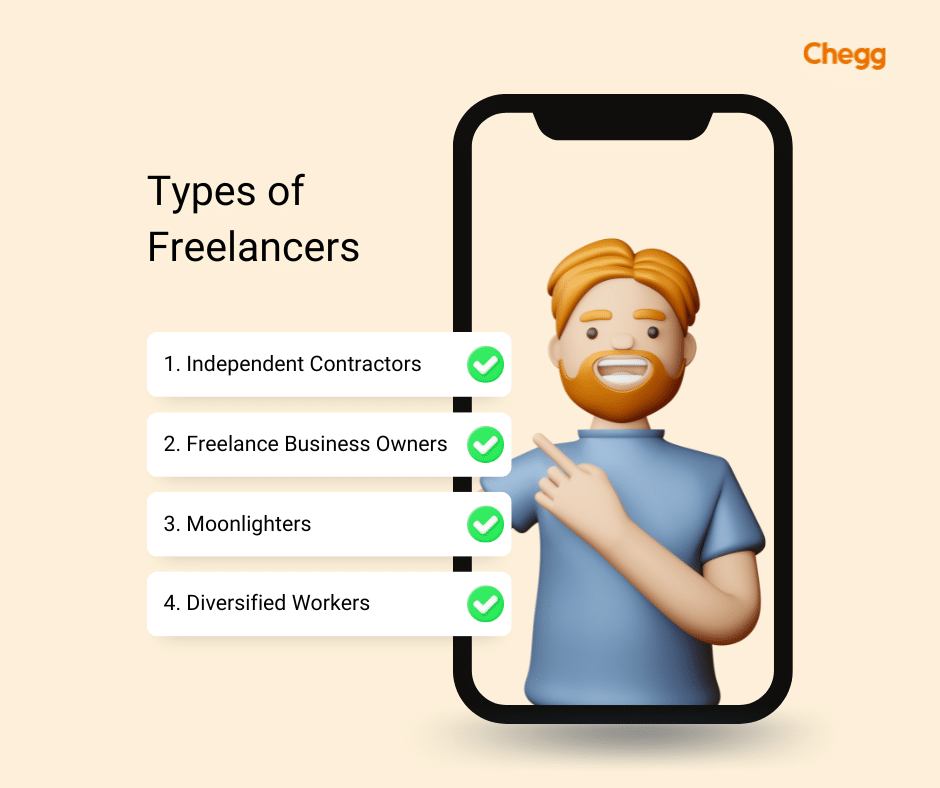
Quick Summary
Table of Contents
Freelancing is becoming more popular in India as people seek flexible work options and better income opportunities. But what is freelancing, and how does it work? In this detailed article, we will explore the freelancing meaning, its benefits, challenges, and how you can start your freelancing journey in India.

Freelancing meaning refers to working independently on a project or task for multiple clients without being permanently employed by any company. A freelancer offers their services based on their skills and gets paid per project or hourly basis.
Freelancing means working independently for different clients and earning money without being tied to a single employer.
Understanding freelancing meaning also includes knowing how it functions. As a freelancer, you offer your skills and services through online or offline platforms, complete assigned tasks, and get paid in return.
Highly recommended :- Discover the World of Freelancing with Chegg India
Many people in India are turning to freelancing because it offers several advantages. Let’s explore some key benefits to understand freelancing meaning better.
While freelancing has many benefits, it also comes with challenges. Understanding these will give you a complete freelancing meaning.
Starting freelancing in India is an exciting journey that offers immense flexibility and potential for income. Here’s a comprehensive guide to get you started:
Have you ever wondered what freelancing meaning? Well, freelancing means working for yourself instead of a company. You get to be your own boss and choose which projects you want to work on! Let’s learn how you can start your freelancing journey in India.
The first and foremost task is to set clear goals. Because without proper goals you can’t know where you are going. Setting goals first gives you a clear understanding of which direction you should go in your freelancing journey. You can do this easily by answering the following questions:
If you have learned the freelancing meaning, then identifying your skills is another important step. You must excel because a freelancing career is built on the foundation of your skills.
Freelancers operate in a diverse array of fields, leveraging their expertise and skills to meet the specific needs of clients. Here are some common fields in which freelancers often thrive:
Even if you’re already good at something, there’s always room to get better! Watch YouTube videos, take online courses, or practice every day. The better you are, the more people will want to work with you.
Think of this as your digital photo album of work. If you’re an artist, include your best drawings. If you’re a writer, show your best articles. This helps people understand what you can do.
Once you understand what freelancing means in practice, try these beginner-friendly sites:
Once you’ve identified your goals and skills, the next step is to seek out potential clients in the freelancing meaning of the term. Conduct thorough research to find quality customers relevant to your industry.
For instance, if you’re a content writer, target businesses that need copywriters and bloggers. Platforms like LinkedIn are great for this. Similarly, those skilled in social media management can discover clients on Instagram and Facebook.
What many freelancers overlook early in their careers is the distinction between skill and service. Your skill is the expertise you use to complete a task, while your services are the work for which you get paid in the freelancing meaning of the term.
For instance, content writing is a skill, but copywriting is a service. Similarly, coding is a skill, whereas developing customized mobile applications is a service.
Marketing your services involves identifying your clients’ problems and demonstrating how your services can effectively address these issues.
The final step is determining how much to charge for your services. This decision depends on the client you’re working with and the level of effort you’re investing in the project.
In the freelancing meaning of the term, there are four fundamental approaches to setting your rates.
Starting as a freelancer might feel scary at first, but everyone begins somewhere. Focus on doing good work, being honest, and learning from each project. Soon, you’ll understand what successful freelancing meaning and how to make it work for you!
Pro Tip: Start freelancing as a side job while studying or working. This way, you can learn without pressure and build your client base slowly.
Recommended Article :- A Beginner’s Guide on How to Become a Freelancer
To understand freelancing meaning better, let’s compare freelancing with traditional full-time jobs.
| Factors | Freelancing | Full-Time Job |
|---|---|---|
| Work Flexibility | High | Low |
| Income Stability | Variable | Fixed Salary |
| Job Security | No | Yes |
| Work-Life Balance | Better | Limited |
| Growth Potential | High | Moderate |
After grasping the freelancing meaning, it’s important to explore the various types of freelancers. Here’s a list of freelancer categories you should be aware of.

Independent contractors are full-time freelancers who operate autonomously on specific projects. In the freelancing meaning of the term, they can work for multiple employers simultaneously and are compensated on a project basis.
This type of freelance job includes individuals who run a business while collaborating on one or more projects. In the freelancing meaning of the term, the owner of this business is also considered a freelancer and works alongside a team of other freelancers.
These freelancers maintain a traditional 9-to-5 job while taking on freelance projects in the evenings. In the freelancing meaning of the term, they excel at managing their work-life balance. They often pursue freelance work to meet basic needs or out of passion, which can result in a more stable income and contribute to savings for the future.
These freelancers occupy a space between moonlighters and temporary workers. In the freelancing meaning of the term, they typically work at night after their traditional job, balancing their time between full-time employment and freelance projects. Diversified workers hold multiple full-time positions while also engaging in moonlighting at night, embodying a blend of various categories.
In this type, you are entirely devoted to freelance jobs online as well as your full-time job. As a result, an individual can be making a tremendous amount of money.
There are many opportunities in freelancing. Some popular different types of freelance jobs / freelancing jobs in India include:
India ranks as the second-largest market for freelancers globally. With the transition of businesses to online platforms, freelancers will find plentiful work opportunities in the freelancing meaning of the term.
Here are some industries that have traditionally been in high demand for freelancers and may offer competitive pay:
Related Article :-
Freelancing is one of the most popular career options in India. As mentioned earlier, job availability is high. However, finding work as a freelancer can be challenging. In the freelancing meaning of the term, there are many tasks to tackle before starting your career, from identifying your ideal clients to discussing your services.
If you are new to freelancing, consider signing up on these popular freelancing platforms:
Detailed Guide :- 20 Best Freelancing Sites in India
Freelancing meaning is all about working independently, choosing your own projects, and earning money without being tied to a company. It provides flexibility, income opportunities, and career growth. However, freelancing also requires self-discipline and effort to find consistent work.
If you want to start freelancing in India, follow the steps outlined in this article, and you’ll be on your way to building a successful freelance career. Happy freelancing!
Chegg allows you to earn extra income by taking a few hours out of your day. If you are an expert in any subject like engineering, earth science, maths, business, etc., you can become a Q&A expert in Chegg. As an expert, you have to answer questions related to the subject.
Freelancing meaning is simple- you are free to work from anywhere and for any employer. This is one of the best benefits of freelancing. There is a lot of demand for freelancing jobs, which have seen a growth of 22% in the last few years. You can find the best freelancing jobs online easily.
You will be paid for every correct answer. It is a part-time job that will allow you to work from the comfort of your home and will give you all the benefits including working as per your schedule and timely payments.

A freelance job means working independently for different clients rather than being employed by one company. Freelancers are self-employed professionals who offer their skills and services on a project-by-project basis. They can choose their work hours, clients, and rates while managing their own business responsibilities.
Common freelancer examples include:
1. Writers creating content for websites
2. Designers making logos for businesses
3. Developers building websites and apps
4. Photographers shooting events
5. Consultants advising companies
6. Tutors teaching online
A freelancer provides specialized services to multiple clients while managing their own business operations. They handle client communication, project delivery, invoicing, and business development. Freelancers are responsible for their own taxes, insurance, and professional development.
To start freelancing, begin by identifying your marketable skills and choosing your niche. Create profiles on popular freelancing platforms like Upwork or Fiverr, build a portfolio of your work, and start bidding on small projects. Network online, establish your rates, and gradually build your client base while learning about business management and taxes.
The best skills for freelancing currently include:
1. Web development and programming
2. Digital marketing and social media management
3. Content writing and copywriting
4. Graphic design and illustration
5. Video editing and animation
6. Virtual assistance
7. Data analysis and research
8. Translation services
Freelance salaries vary widely depending on your skills, experience, and industry. Entry-level freelancers might earn $15-30 per hour, while experienced professionals can charge $50-200+ per hour. Many successful freelancers earn $40,000-100,000 annually, though income can fluctuate monthly.
फ्रीलांसिंग का मतलब है स्वतंत्र रूप से काम करना। इसमें आप किसी कंपनी के स्थायी कर्मचारी नहीं होते, बल्कि अलग-अलग क्लाइंट्स के लिए प्रोजेक्ट आधारित काम करते हैं। आप अपने काम का समय, दर और क्लाइंट खुद चुन सकते हैं।
Freelancing works by connecting skilled professionals with clients who need their services. Freelancers find work through online platforms, personal networks, or their own websites. They negotiate project terms, complete the work, and get paid directly by clients. Success depends on building a strong reputation and maintaining good client relationships.
For students, freelancing offers flexible part-time work that fits around studies. It provides practical experience, portfolio building opportunities, and extra income. Students can start with simple projects related to their studies or interests, gradually developing professional skills and client relationships.
In business terms, freelancing represents a flexible workforce model where companies hire independent contractors for specific projects or tasks. This approach helps businesses access specialized skills without the commitment of full-time employment, while giving professionals the freedom to work with multiple clients and manage their own careers.

Authored by, Amay Mathur | Senior Editor




Amay Mathur is a business news reporter at Chegg.com. He previously worked for PCMag, Business Insider, The Messenger, and ZDNET as a reporter and copyeditor. His areas of coverage encompass tech, business, strategy, finance, and even space. He is a Columbia University graduate.
Editor's Recommendations
Chegg India does not ask for money to offer any opportunity with the company. We request you to be vigilant before sharing your personal and financial information with any third party. Beware of fraudulent activities claiming affiliation with our company and promising monetary rewards or benefits. Chegg India shall not be responsible for any losses resulting from such activities.
Chegg India does not ask for money to offer any opportunity with the company. We request you to be vigilant before sharing your personal and financial information with any third party. Beware of fraudulent activities claiming affiliation with our company and promising monetary rewards or benefits. Chegg India shall not be responsible for any losses resulting from such activities.